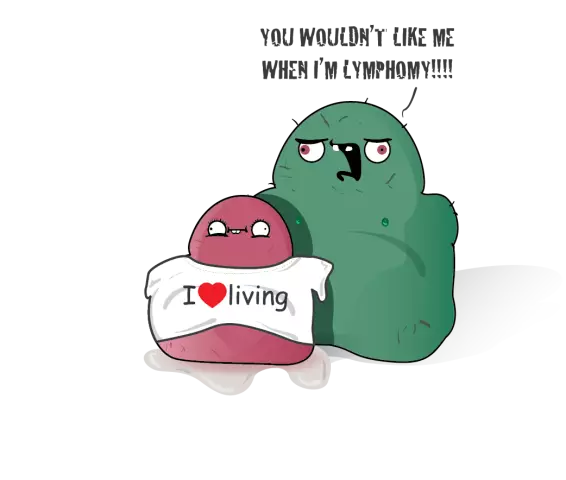- Author Rachel Wainwright wainwright@abchealthonline.com.
- Public 2023-12-15 07:39.
- Last modified 2025-11-02 20:14.
How to understand that the spleen hurts

The spleen is rightfully considered one of the most mysterious organs of the human body. For a very long time, it was considered a full-fledged part of the digestive tract, which was largely due to its location. However, being close to the pancreas and other organs of the digestive tract, the spleen still belongs to the immune system and does not take part in digestion processes. That is why it is often difficult to determine when the spleen hurts, and when the problem lies in diseases of the pancreas. Many experts even call it an illogical organ.
Spleen hurts: causes
Although the spleen is not considered to be a vital organ, it nevertheless performs very important functions in the human body. It is a kind of filter that monitors and snatches dead cells from the bloodstream, and also controls all kinds of bacteria. In addition, it contains a substance that the body needs, such as iron.
In the absence of external factors, the spleen hurts, as a rule, when the organ grows and changes, starting to put pressure on the neighboring ones. In the presence of physical impact, pain is accompanied by additional signs of malaise, depending on the type of injury received. It should be noted that the spleen is practically not protected from them, since it is located too close to the surface of the human body.
So, if the spleen hurts, it can be a direct result of an accident, fall, strong blows, injury and other accidents. Usually, closed organ injuries may be accompanied by some additional symptoms:
- Severe pain spreading over the entire surface of the back, radiating to the left clavicle and left scapula;
- Low pressure;
- Profuse cold sweat;
- Chills;
- Tachycardia;
- Angina symptoms.
In similar cases, the loss of a large amount of blood can aggravate the situation. Sometimes the above signs may not be observed, so it is necessary to carefully examine the patient's skin in the abdomen. If it has bruises and bruises, this is a dangerous sign of abdominal bleeding.
In this case, it is possible that the victim will experience a painful shock, since pain in the spleen, the symptoms of which appear very sharply, in such cases are unbearable. It is necessary to apply something very cold to the patient's stomach and try to keep him awake until the ambulance arrives. It is important to know that in this situation no pain relievers should be taken, since they will completely lubricate the symptoms. This will prevent the doctor from making an accurate diagnosis and determining the severity of the patient's condition. Remember that when the spleen hurts unbearably, you should immediately seek the help of a specialist: many fatal cases occur because of the painful shock.
Even if you exclude external factors, when the spleen hurts, there can be a lot of reasons for this. Let's consider the most common ones:
- Spleen infarction;
- Spleen abscess;
- Spleen cysts;
- Tumors of the spleen.
In addition, if the spleen hurts, the cause may be a disease associated with other internal organs and provoking an inflammatory process in the human body. Often, this symptom indicates the presence of diseases such as:
- Cirrhosis of the liver;
- Malaria;
- Anthrax;
- Syphilis;
- Typhus;
- Typhoid fever;
- Infectious lymphocytosis;
- Infectious mononucleosis;
- Viral hepatitis;
- Sepsis.
Spleen pain: symptoms
As already noted, physical injuries to the spleen, both closed and open, are accompanied by sharp cutting pain sensations. However, the symptoms of pain in the spleen in various infectious diseases are no less difficult.
If the spleen hurts due to internal infections, the pain is usually sharp cutting or aching, since the inflamed organ exerts strong pressure on the walls of the protective capsule.
One of the most common diseases of this organ can be called a heart attack, which occurs due to thrombosis of the splenic artery. Symptoms of pain in the spleen with such a disease can manifest themselves in different ways: pain sensations are both sudden and sharp, and dull aching. Sometimes the disease proceeds without any external manifestations.
An abscess of the spleen is the accumulation of pus in the damaged area. This inflammatory process is naturally accompanied by severe pain. Painful sensations may resemble an unpleasant pulsation in the area of an organ.
The spleen often hurts also due to a cyst. There are two types of spleen cysts - parasitic and nonparasitic. A parasitic cyst can be caused by echinococcus or cysticercus. The penetration of parasites into the spleen is possible by hematogenous or lymphogenous pathways. Such a disease can last over fifteen years and not bother the patient with severe pain. Sometimes it manifests itself with allergic symptoms (hives, itching, etc.).
As for the nonparasitic cyst, it can be either congenital or acquired after infectious diseases or injuries. It is characterized by regular dull pain in the left hypochondrium, compression of adjacent abdominal organs (large intestine, stomach, etc.) is often felt.
Both malignant and benign tumors of the spleen can also cause discomfort and pain to the patient, not always. From this it follows: in order to understand why the spleen hurts, it is necessary to be examined by a specialist. You can not rely solely on the symptoms of pain in the spleen and draw independent conclusions.
Spleen hurts: treatment
When the spleen hurts, only an experienced doctor can prescribe treatment, since there is a high probability of making a mistake with the diagnosis. Spleen diseases are usually diagnosed with computed tomography and ultrasound.

With a spleen infarction, pain relievers are usually prescribed and it is recommended to abandon an active lifestyle for a while. Surgery is necessary for an abscess. Splenectomy is usually used for effective treatment. In the case of solitary abscesses, as well as the general serious condition of the patient, drainage of the abscess and percutaneous puncture are used.
Treatment if the spleen hurts due to a cyst or tumor is also done with splenectomy. However, it should be noted that this method is effective for benign and malignant tumors at an early stage. If the tumor has acquired a significant size, splenectomy is only a palliative intervention.
It must be remembered: to find out why the spleen hurts, you need not hesitate with the examination. In no case can you ignore the symptoms of pain in this area. Timely detection of the disease will help to avoid many serious consequences that are fraught with problems with this illogical organ.
YouTube video related to the article:
Found a mistake in the text? Select it and press Ctrl + Enter.






